How To Hire a Full Stack Developer? [Guide 2024]
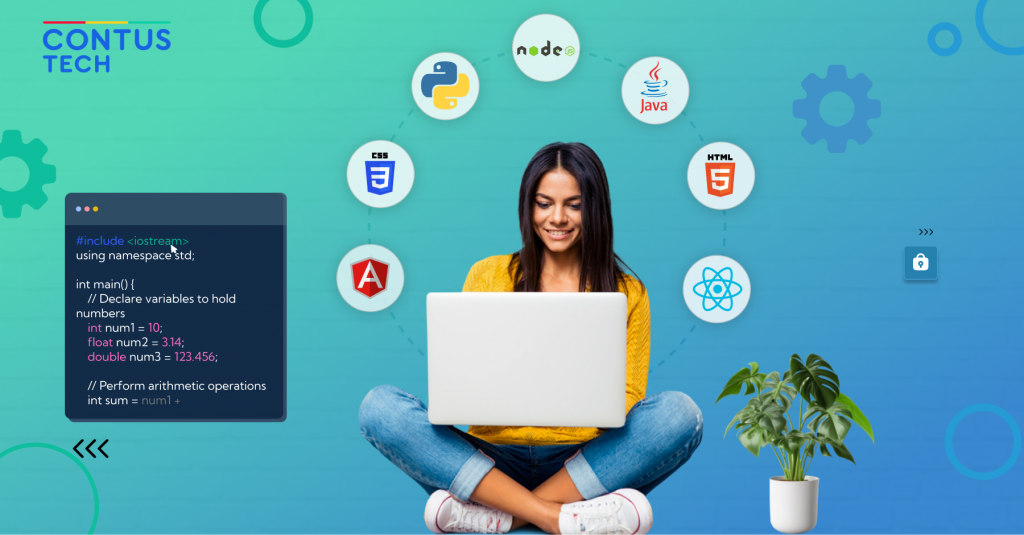
Are you ready to take your IT project to new horizons with full stack developers? If your answer is Yes, then you must understand that the journey to success begins with choosing the right development team.
In today’s software development landscape, hiring a full stack developer is more than just a smart move – it can reshape the entire course of your project.
When you hire a full stack web developer, you tap into a wealth of development expertise.
They don’t just excel at creating user-friendly front-end interfaces; they’re also masters at building robust back-end functionalities.
Full stack programmers seamlessly navigate the entire spectrum of software development, bridging gaps between different technologies to ensure a cohesive and high-quality outcome.
If you’re looking to hire full stack developers for your business, then you’ve landed on the right page.
Let’s start with the most fundamental question.
Table of Contents
Who is a Full Stack Developer?
A full stack developer is a person who is specialized in many fields of website development such as front-end design, back-end programming, database management, and server management.
They know tech stacks like HTML, CSS, JavaScript, and a backend language like Python or Node.js.
From UI to server-side logic they can work on every part of web applications which makes them an asset for any company dealing with complex web app creation or maintenance.
Full stack web developers have extensive knowledge of both front end and back end frameworks. This allows them to build full stack web applications.
Then what is leading to the high demand for hiring full-stack developers?
There are two reasons behind it.
Firstly businesses are increasingly relying on web applications for their operations and hence need more skilled personnel in this area.
Secondly, there is a scarcity of good quality software engineers who can provide end-to-end solutions that meet business requirements quickly enough.
Although now common the term “full stack” was coined in the early 2000s during the boom years of internet development.
The journey they take up before becoming developers is a steep learning curve that equips them with a wide range of skills. These skills allow them to juggle coding intricacies while mastering various aspects of design and testing simultaneously.
Another reason why there’s such demand for these types of programmers lies in how efficiency and agility they bring to the table. They serve as the driving force behind cost-effective solutions.
8 Steps on How to Hire a Full Stack Developer for Your Project
These 8 steps serve as a detailed guide on how to hire a full stack developer, ensuring that you attract candidates with the technical and soft skills necessary for the role.
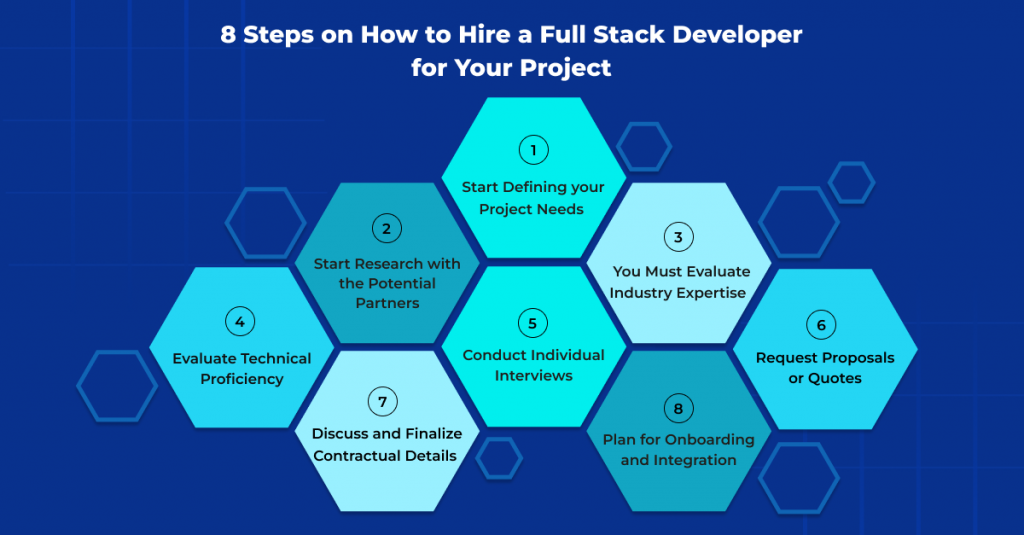
Step 1: Start Defining your Project Needs
- If there is sufficient time and funding, you should give time to searching the features that are required for the initial release over those that can be added later.
- Determine any technological constraints, such as those related to online or mobile platforms, tech stacks, the need for third-party integrations, performance requirements, security issues, or legal restrictions.
- Break down the project into phases or milestones and estimate the amount of effort and money needed for each, to create a realistic timeline and budget.
- Before moving forward, formally approve the requirements document (PRD), schedule plan with deliverables and milestones, anticipated budget, and the entire project scope with all decision-makers.
Step 2: Start Research with the Potential Partners
- To locate accessible programming talent, search digital communities like GitHub and Stack Overflow and service providers like CONTUS tech, etc.
- Make the most of your current network by asking friends, investors, attorneys, and other business associates for recommendations of programmers they’ve previously worked with.
- Examine the ratings and reviews on websites for programmers, such as Clutch, G2 Crowd, and the portfolios and case studies on their own websites.
- Seek specific knowledge and experience if your project calls for proficiency in fields such as artificial intelligence, blockchain, cybersecurity, etc.
- To enable more seamless communication, take into account variables like time zones and geographic location when assessing remote programmers.
Step 3: You Must Evaluate Industry Expertise
- Analyze case studies and programming project examples done by developers in your niche (e.g., e-commerce, healthcare, finance, etc.).
- Look for relevant degrees, certifications, and training that prove their subject matter expertise or fill any specific skill gaps you have.
- Make sure they’ve worked under the same regulations, laws, and industry best practices you’re required to follow.
- For example: If you work with Java,.NET or React — check if they are proficient with those tools or not.
- Ensure through technical discussions that they understand use cases, workflows, and jargon peculiar to your field.
Step 4: Evaluate Technical Proficiency
- Have programmers complete technical screening tasks or exams that mimic the type of work they would do on your project.
- Look at code samples from previous projects they worked on to see if they followed best practices, coding style, organization, and comments.
- Ask for architectural solutions and system design techniques to assess their technical design skills.
- Give them a few debugging scenarios or example problems so you can evaluate their problem-solving and troubleshooting abilities.
- Measure soft skills like verbal and written communication abilities as well as how well they can articulate technical concepts clearly.
- Check if they follow DevOps procedures, code reviews, version control, unit testing, etc. while coding.
Step 5: Conduct Individual Interviews
- Use behavioral job interview questions to discover how a candidate acted in different employment-related situations.
- Ask them about both foundational and complex programming concepts as a way of gauging their breadth of knowledge.
- Role-play with applicants on how they would handle a conflict with another team member or what they would do if a client asked for last-minute changes.
- If you want to know someone’s thinking style and ability to think critically, ask them what they like doing when not coding or which subjects they find interesting.
- Permit the developers to interview their potential internal team to ensure that both sides are happy working together.
- Check past clients’ or employers’ references for quality assurance purposes.
Step 6: Request Proposals or Quotes
- Provide very clear, detailed, and structured requirements documentation to the programmers so they understand exactly what you need built.
- Set specific scoring criteria and weightings for evaluating proposals on factors like cost, timelines, technical approach, team structure etc.
- Request line-item pricing that breaks down costs for different components like design, development, testing, deployment etc.
- Ask for hourly or monthly rates if the project scope is likely to change, as well as rates for ongoing support/maintenance.
- Have them outline their proposed technical approach, project management methodology, tools, framework solutions, etc.
- Get realistic timeline estimates with a breakdown of key milestones and deliverables to measure progress.
- Understand the full team structure – who will be working on your project, their roles, time allocations, and how the team is structured.
Step 7: Discuss and Finalize Contractual Details
- Discuss and agree on intellectual property ownership and rights over the code, designs, documents, and project deliverables upfront.
- Determine communication channels and processes for meetings, updates, requesting changes, escalations etc.
- Establish service level agreements (SLAs) that define metrics like uptime, response times and penalties for missed deadlines.
- Include quality metrics, testing requirements, bug-fixing processes and acceptance criteria in the contracts.
- Account for scenarios like employees taking sick days, long vacations, turnover and how resources will be replaced or replenished.
- Confirm payment schedules – whether it will be monthly, milestone-based, retained etc. and invoicing/billing details.
Step 8: Plan for Onboarding and Integration
- Give the programming team access to all required tools, documentation, credentials and resources they’ll need.
- Set up version control systems, code repositories, development/staging environments and deployment processes.
- Agree on the specific project management and communication tools you’ll use like Jira, Trello, Slack etc.
- Provide introductions to relevant internal teams/stakeholders the programmers will need to collaborate with.
- Discuss processes for how feedback, change requests, and approvals will flow between your team and theirs.
- Create a detailed knowledge transfer plan for how intellectual property and project knowledge will be shared.
Recommended Reading
What are the Benefits of Hiring a Full Stack Developer?
A full stack programmer can handle various roles within a project that range from designing the user experience to implementing backend logic.
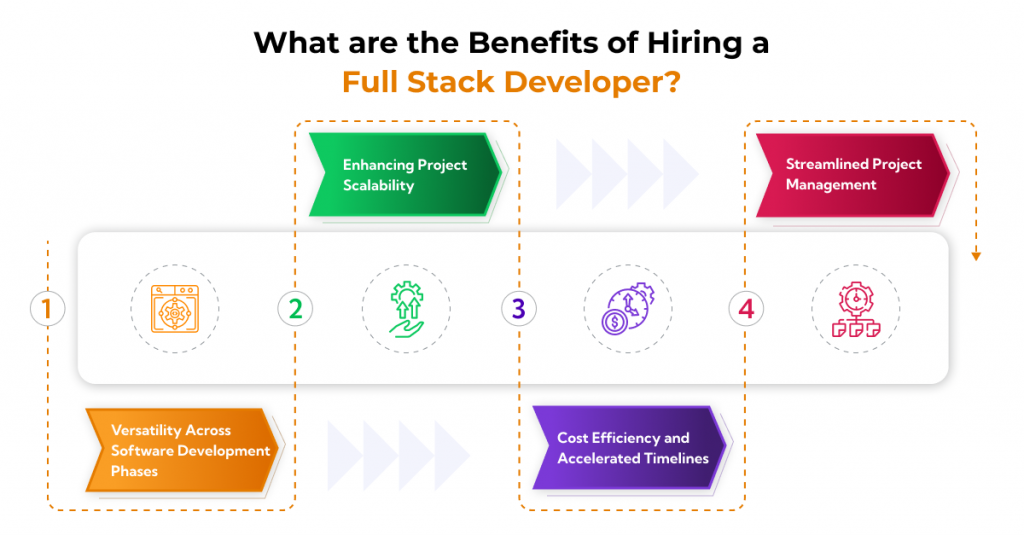
#1 Versatility Across Software Development Phases
Full-stack developers are ideal when you can’t hire specialists for each phase of software development.
These versatile professionals can handle multiple aspects of your project, offering comprehensive expertise.
Though their rates may be higher than other software talent, their broad experience often justifies the cost, providing value across various development layers.
#2 Enhancing Project Scalability
Full-stack developers enhance project scalability due to their versatility across different levels of software architecture.
Their ability to adapt to various environments allows clients to easily build and scale development teams. This flexibility is a key business advantage, enabling smoother project expansion and more efficient resource allocation in software development initiatives.
#3 Cost Efficiency and Accelerated Timelines
A single Full-Stack Developer can handle diverse tasks, eliminating the need for multiple specialized developers. This approach accelerates project completion and substantially reduces costs compared to employing a team of specialists.
#4 Streamlined Project Management
Full stack programmers have diverse skill sets, enabling them to handle projects that would typically require multiple specialists. This versatility streamlines project management and offers significant cost savings for employers.
They handle multiple tasks, eliminating the need for various specialists. This approach accelerates project completion and significantly reduces costs compared to employing a team of specialized developers.
In the end hiring a full-stack software developer brings multiple benefits: cost-effectiveness, enhanced problem-solving skills, increased flexibility, access to a broad range of technical expertise, and improved project management capabilities.
Where Can I Find a Full Stack Developer for Hiring Purposes?
Whether you need full-time or part-time resources, there are numerous platforms and options to explore when looking to hire full-stack developers for your projects.
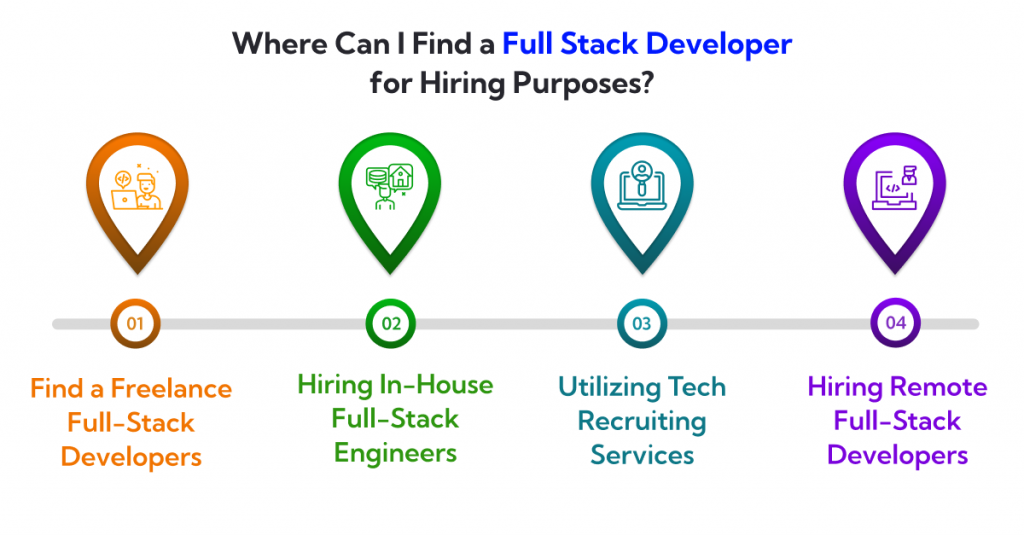
1. Freelance Full Stack Developers
For the urgent needs of your projects, freelancing platforms have made it incredibly convenient to find and hire talented full-stack engineers.
This approach is one of the best choices because you can bring developers into projects that are specific and scale your team up or down based on those situations.
Platforms: Upwork, Freelancer, Toptal, Fiverr, Guru, etc..,
Pros – Access to a global talent pool, cost-effective pay-as-you-go model; both hiring and firing move quickly.
Cons – Difficult to select the right programmer ads because there are so many options available, It takes to lot of time to analyze their skillset — as you want prior knowledge on this.
2. In-House Full Stack engineers
Businesses with a consistent workload and long-term projects should consider bringing in-house full stack programmers into the company as permanent employees.
Businesses with a consistent workload and long-term projects should consider bringing in-house programmers to provide full stack development services as permanent employees
These engineers become fully immersed in your company’s culture, goals, and processes—and therefore possess a deeper understanding with commitment.
Platforms: Job boards (Indeed, Monster), LinkedIn, CONTUS Tech, etc..
The Pros: Direct control; seamless integration into your team’s dynamics.
The cons: The recruitment and onboarding processes can be time-consuming and costly, especially if you’re competing for top talent in a tight job market
3. Tech Recruiting Services
If you’re struggling to find the right fit or simply lack the resources for an extensive recruitment process, tech recruiting services can be a game-changer.
These specialized agencies have access to a vast network of pre-vetted full-stack developers and can streamline the hiring process for you.
Platforms: Toptal, Turing, Andela, X-Team etc..
The Pros: Access to a curated pool of talented professionals, a streamlined hiring process, and expertise in technical recruiting.
The Cons: Additional fees for the recruiting service, limited control over the vetting process, and a potentially less personalized approach.
4. Remote Full-Stack Developers
Hiring remote full-stack developers is becoming increasingly popular and feasible in our digital world. In this way, you can access the global talent pool —- where you can get a perfect match for your project or team with no regard to geographical boundaries.
Platforms: CONTUS Tech, RemoteOK, We Work Remotely, Remote.co, Upwork, Freelancer.
Pros: Access to worldwide expertise, possible cost savings, flexible work arrangements.
Cons: Time zone challenges, cultural barriers, managing remote teams.
However, at the close of business time, it all boils down to your specific needs in terms of budget and project requirements. Each approach has its advantages as well as disadvantages therefore the decision should be weighed carefully.
But whatever route you take it is worth noting that finding a talented full stack developer will make a difference to your business by helping you accomplish intricate projects better.
It is thus important that one looks into options before settling on what suits their group best!
Why Hire Full Stack Developers From CONTUS Tech?
Contus Tech serves as a premier marketplace connecting businesses with top-tier remote full-stack developers.
Each of our developers is armed with extensive experience garnered from pivotal projects with multinational corporations.
Our portfolio includes collaborations with companies like Daimler, Tata, Abu Dhabi Commercial Bank, Versa Inc., and more.
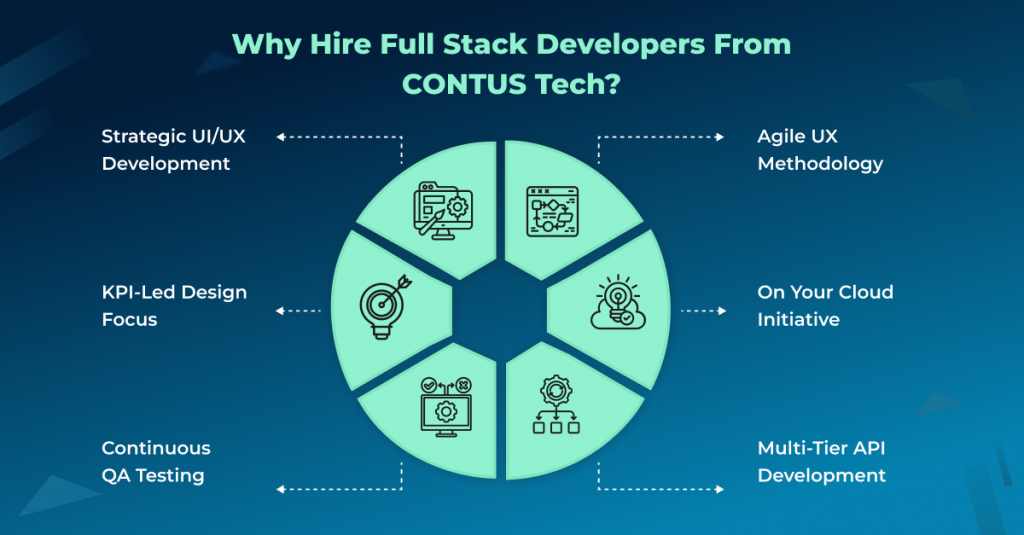
Here are the 6 reasons why you should hire full stack developers from CONTUS Tech:
1. Strategic UI/UX Development
CONTUS Tech is renowned for building visually-pleasing, user-friendly UI/UX development. Our web home page is a good example.
So whenever you hire full stack web developers from us, we make sure your brand aesthetics is also taken into consideration. This helps us achieve measurable business impact and create winning user interfaces.
2. Agile UX Methodology
With CONTUS Tech, you hire full stack developers who can embrace adaptability and responsiveness with Agile UX methodology. This allows us to better respond to evolving project needs for streamlined web development.
3. KPI-Led Design Focus
At CONTUS Tech, we Prioritize tangible results with our KPI-led design approach. So, whenever you hire full stack web developers from us we make sure every aspect of development is aligned with achieving measurable business goals.
4. Multi-Tier API Development
Elevate your project to the next level with CONTUS’ expertise in multi-tier API development. We guarantee seamless integration and functionality across diverse platforms.
5. Continuous QA Testing
Ensure the highest quality in your applications with our commitment to continuous QA testing, delivering robust and error-free solutions for unparalleled user experiences.
6. On Your Cloud Initiative
Experience the pinnacle of scalability, security, and efficiency with our ‘On Your Own Cloud’ initiative. We handpick high-performing cloud platforms to build, deploy, and manage enterprise applications.
This way, you can ensure your project stays at the forefront of cloud technology.
Wrapping Up
Undoubtedly, full stack developers are drivers of innovation, expertise, and efficiency. They offer a complete solution and navigate frontend and backend intricacies in every phase of your project.
And it is for this reason that industries across verticals — computer software, IT and services, financial services, ed-tech companies, connected vehicles, etc. — are actively hiring full stack developers.
And, if you’re looking to hire a full stack web development company with years of industry and domain expertise, look no further than CONTUS Tech. We have a 300+ team of certified full stack web developers for hire. And, the best part is that you can get started in just 2 days.
From Concept to Execution, Our Tech Mavericks Have Evolved As Full Stack Developers Who Can Think Long-Term And Delivery Results In Short-Term With Full Stack Development
Frequently Asked Questions (FAQs):
1. How much does it cost to hire a full stack developer?
The cost to hire Full-stack developers typically range between $35 and $65 per hour on average. However, highly experienced engineer may command rates exceeding $100 per hour. The pricing is influenced by several factors, including the developer’s educational background, years of experience, technical proficiency, and knowledge of specific frameworks.
2. Why do businesses hire full-stack developers?
Businesses hire full-stack developers for their versatility and end-to-end project development acumen. Our team of 200+ full-stack developers is highly proficient in handling both front-end and back-end development and streamlining project workflows. Their consolidated expertise translates to faster development cycles, cost efficiency, and a holistic approach, ensuring holistic solutions for your web and mobile app development needs.
3. What skills and technologies should I prioritize when hiring a full-stack developer?
When hiring a full-stack developer, you must prioritize the one with expertise in front-end technologies (HTML, CSS, JavaScript) and back-end frameworks (Node.js, Django, Ruby on Rails). For instance, our developers have expertise across diverse tech stacks (20+). We ensure they align with your project requirements, stay updated on industry trends, and deliver cutting-edge solutions.
4. How do I hire a dedicated full-stack engineer?
Hiring a dedicated full-stack engineer is as easy and seamless as it gets with CONTUS Tech. You can simply contact our team and share your project requirements, and we’ll match you with a skilled, professional development team. This way, you can benefit from a dedicated resource working exclusively on your project without juggling around multiple projects. It also ensures focused attention, timely delivery, and a long-term, collaborative partnership that aligns with your business goals.
5. How do you manage time zone differences when working with clients in different geographical locations?
We understand the significance of global collaboration, and our approach to time zone differences is quite strategic. Our full-stack developers are adept at flexible working hours and we ensure overlap with your business hours. Additionally, we employ efficient communication tools and establish clear schedules to foster efficient collaboration regardless of geographical distances. At any cost, we make sure your project progresses smoothly, meets deadlines, and exceeds expectations.

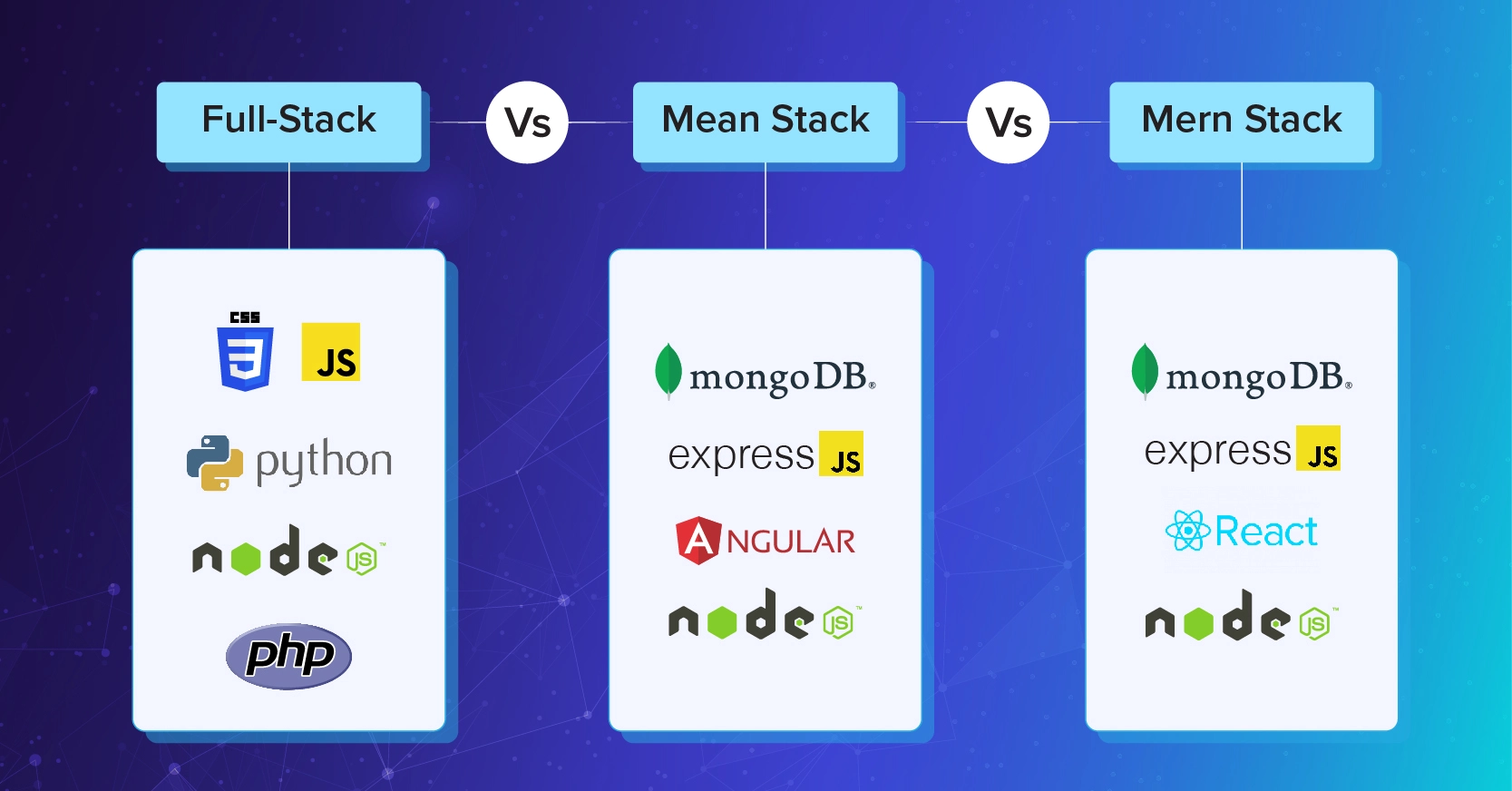
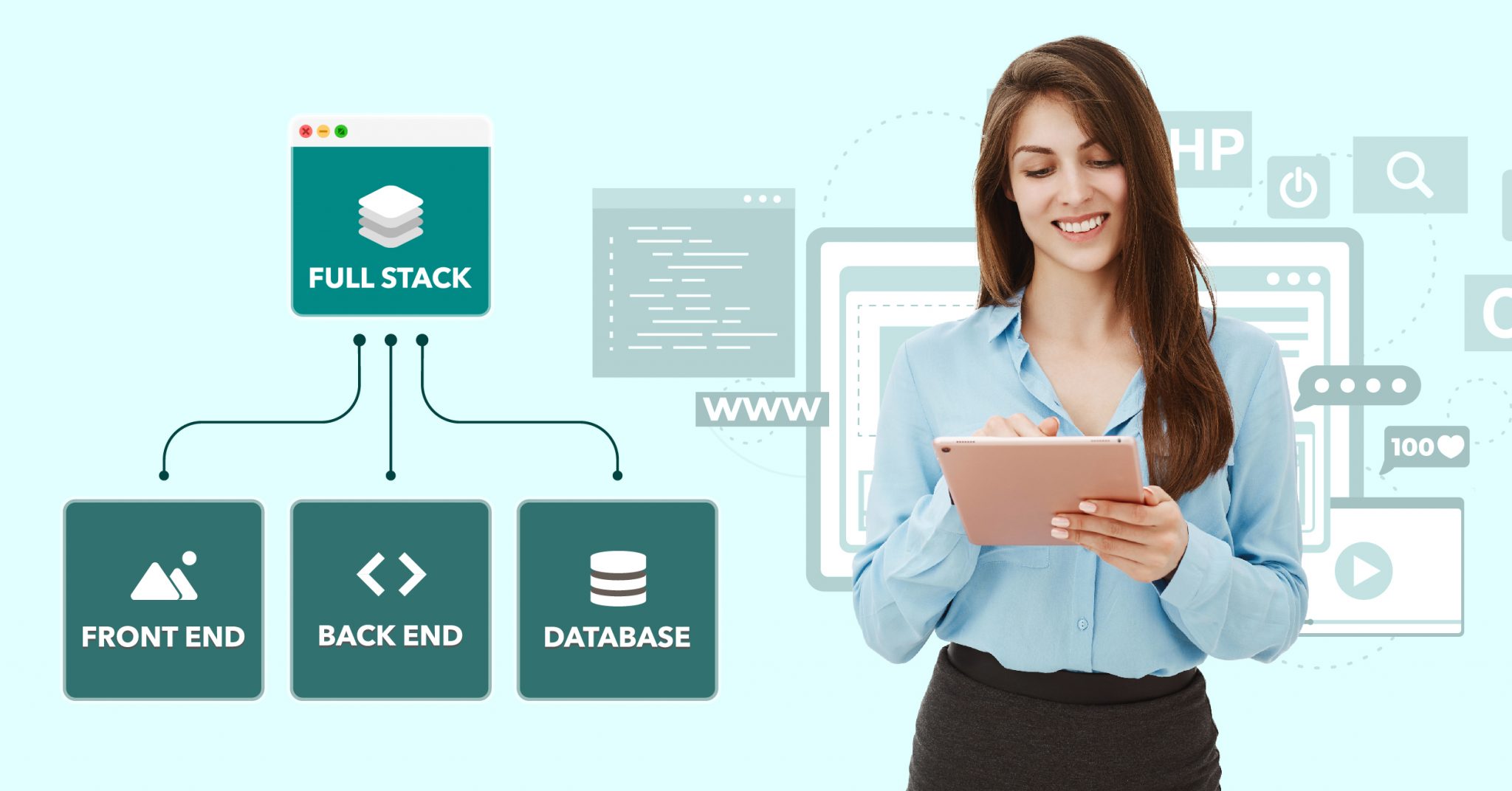
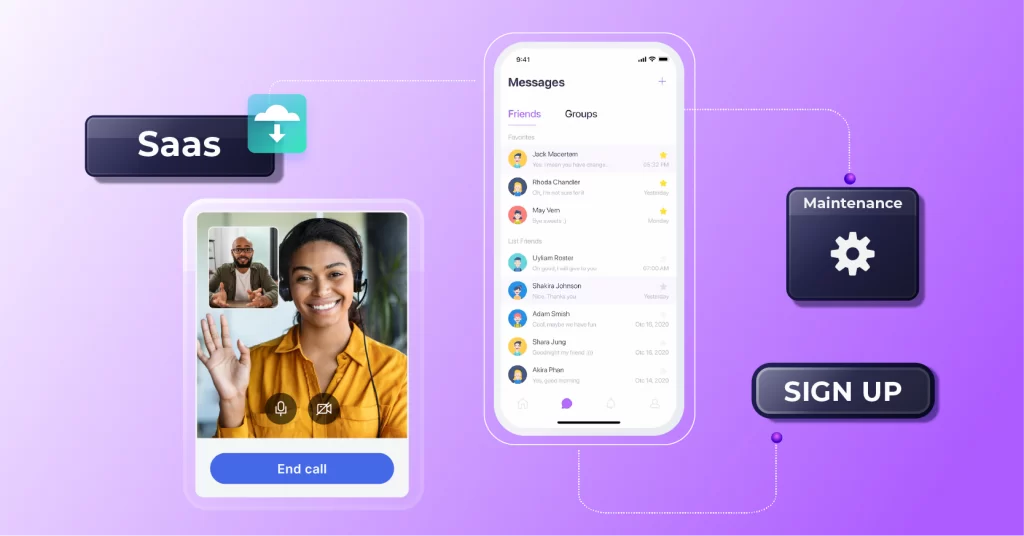


Informative and very helpful content,Thanks for sharing your views.Good job.Keep going on.
Great guide! One key point I’d like to emphasize is the importance of assessing both technical and soft skills during the hiring process. A well-rounded full stack developer not only excels in coding but also communicates effectively and collaborates seamlessly with the team.
Hi Patty
Thanks for your comment! Fully agree on the importance of both technical and soft skills. It’s key for a successful full stack developer.
Hi, Loved the checklist for technical skills! It’s comprehensive and covers everything from front-end technologies to back-end frameworks. Definitely a handy resource for hiring a full stack developer to build a high-performing development.
Glad you found the checklist useful! Hiring a proficient full stack developer is essential for top-notch development. Let me know if you need more assistance.
I’ve been considering hiring a full stack developer for my side project, and your guide gave me the clarity I needed. It’s evident that you know the hiring process inside out
Hi Sophie,
I’m delighted the guide clarified your hiring process; if you need more assistance, feel free to ask!
Your guide has been incredibly insightful as I navigate the process of hiring a full stack developer for my project. I now feel equipped to ask the right questions and assess candidates effectively. Thank you for sharing your expertise!
Thanks for this guide! I’m currently in the process of hiring a full stack developer for my startup, and these insights are incredibly helpful. It’s essential to find someone with a diverse skill set and a passion for both front and back end development.
Your guide is a fantastic resource for hiring full stack developer like myself. The step by step guide & tips for assessing cultural fit are particularly valuable. This will undoubtedly streamline our hiring process
Hi Patrick,
Glad you found the guide helpful for hiring full stack developers like yourself! If you need more tips or help during your hiring process, just let me know. Best of luck streamlining your hiring process!
Is full stack and mean stack are two different concepts?
Hello Will,
Here is the brief note. A full stack developer is someone, who handles both frontend & backend development process of an application. A full stack developer can use any technology stack (LAMP stack, Django stack, and Ruby stack etc.) for the development process. While, a MEAN stack developer is someone who uses only a particular set of technologies (M-MongoDB, E- Express Js, A-Angular Js, N-Node JS) during the Full stack web development.
I appreciate your emphasis on assessing a full stack developer’s ability to adapt and learn. In the tech world, flexibility is key, and your guide reflects that reality.
This guide on hire full stack developer fine for me. I’m always on the lookout for skilled full-stack developers for my clients, and your tips on assessing both front-end and back-end skills are spot-on. Excited to implement these strategies in our recruitment process!
Your guide is a one-stop-shop for anyone looking to hire a full stack developer. The tips on checking references and the sample interview questions are particularly helpful.
I’ve been struggling to find a full stack developer for my project. Your tips on where to look and what to ask during interviews are incredibly helpful. Thanks for sharing your expertise!
we currently in the process of hiring a full stack development service, and your guide is a goldmine of information. The checklist for assessing skills is a game-changer
Thank you Tamera! We’re glad to hear that you found our guide helpful. Best of luck with your hiring process!
your complete guide to hiring full-stack developers is fine! The step-by-step breakdown and tips are incredibly helpful. As someone in the hiring business, this resource is a best resource. Looking forward to more insights from you
This guide is a lifesaver! As a startup founder, finding the right full stack developer is crucial. Your step-by-step approach makes the hiring process much less daunting
Thank you for this comprehensive guide! Hiring a full-stack developer for our startup has been on my to-do list, and your article has given me the confidence to navigate the hiring process effectively. Much appreciated
You’re welcome! Best of luck with hiring the perfect full-stack developer for your startup!
This guide is a must-read for aspiring full-stack developers as well. It provides valuable insights into what recruiters are looking for. I’ll be sharing this with my coding cohort for sure
Your guide perfectly captures the challenges and opportunities in hiring full-stack developers. The emphasis on evaluating real-world projects is a game-changer.
Wow, I never realized there were so many aspects to consider when hiring a full stack developer. This guide opened my eyes to what truly matters in the hiring process.
Thank you Guillermo, It’s amazing how many factors come into play when hiring the right talent. Best of luck with your hiring process!
This guide couldn’t have come at a better time. I’m in the midst of hiring a full stack developer, and these tips are exactly what I needed to refine my search.
This post has convinced me of the value of full stack developers. We’re definitely going to invest more in finding the right ones for our team.
Hy, I appreciate the focus on soft skills and cultural fit. These are just as important as technical skills in ensuring a successful hire.
It’s amazing how this blog breaks down the entire hiring process into manageable steps. This will definitely help us avoid common pitfalls.
Thank you Juanita! I’m glad you found the breakdown of the hiring process helpful. Making complex processes more manageable is always the goal.
Its a incredibly detailed post! The eight-step process to hire a full stack developer is exactly what I needed to streamline our recruitment efforts. Thanks for the guidance!
I’m glad you found the post helpful! The eight-step process is a great way to ensure a smooth and efficient hiring process. Best of luck with your recruitment efforts!
Hello, I’ve been burned in the past by hiring the wrong developer for my projects, so I’m grateful for the advice in this guide. It’s clear that finding a full stack developer goes beyond technical skills—it’s about finding someone who aligns with your company culture and goals.
I’ve been tasked with hiring a full stack developer for our agency, and I couldn’t have stumbled upon this guide at a better time. Your emphasis on communication skills and adaptability resonates with what we’re looking for in a candidate.
Hello, The tip about evaluating a developer’s ability to work in a team is often overlooked but so important. Collaboration is key in any project, and a full stack developer who can seamlessly integrate with the team brings immense value to the table.
Hello Jana! Absolutely agree. A developer’s technical skills are crucial, but their ability to collaborate effectively with a team can make or break a project. Team integration and communication are essential for success in any development endeavor.
The recommendation to check for experience with cloud services is so relevant in today’s tech landscape. Whether it’s AWS, Azure, or Google Cloud, a full stack developer comfortable with cloud platforms can contribute to scalable and efficient solutions.
Hello, I love how this guide dives deep into the importance of cultural fit. It’s not just about finding someone who can code; it’s about finding someone who looking to hire a full stack developer for project.
Hi Jan Kelley!
Thanks for your comment! I’m glad you appreciated the focus on cultural fit. It’s definitely crucial when hiring a full stack developer. If you have any more insights or questions, feel free to share!
What should I consider when hiring a full stack web developer for my startup?
Consider their experience with both front-end and back-end technologies relevant to your project. Evaluate their problem-solving skills and ability to integrate different tech stacks. Flexibility and communication are also crucial for startup environments.
Hey Its a great blog, BTW, How can I ensure that the full stack developer I hire will fit well with my team?
Conduct thorough interviews, include technical and behavioral questions, and consider having them meet with your team. Check references and past work to ensure they align with your project needs and team dynamics.
Great blog! Now tell me what should I include in a proposal when hiring a full stack developer?
Your proposal should detail the project scope, technical requirements, timelines, and budget. Include specific goals, deliverables, and any preferred tech stacks. Clear criteria for evaluation and a breakdown of costs are also essential.